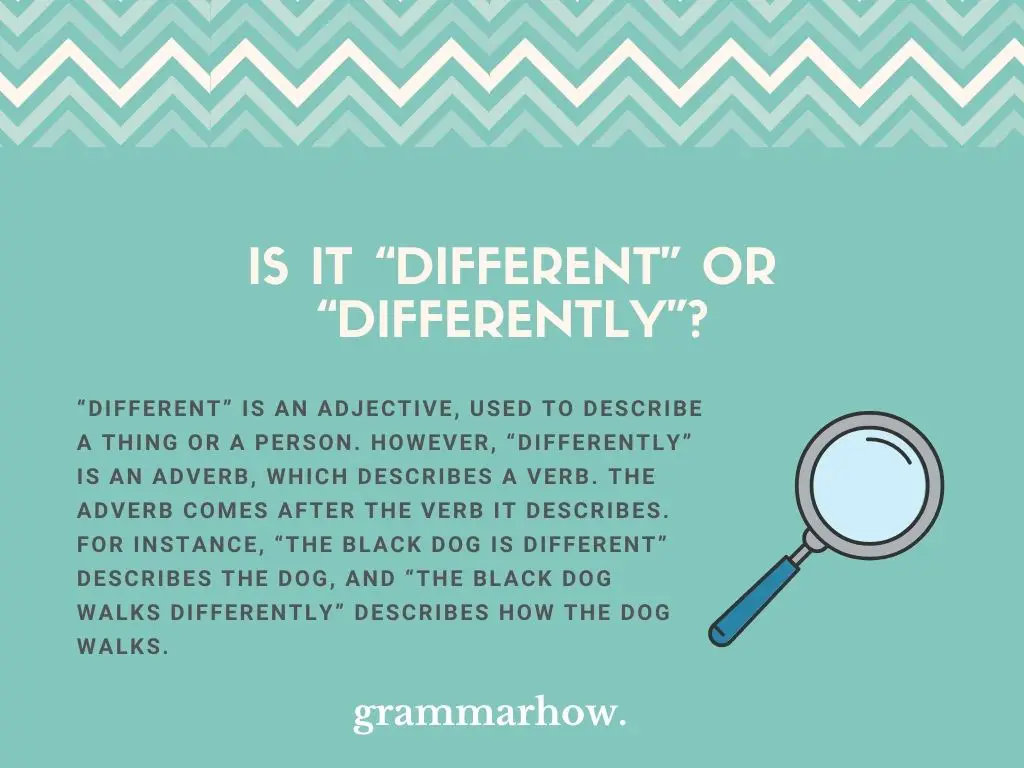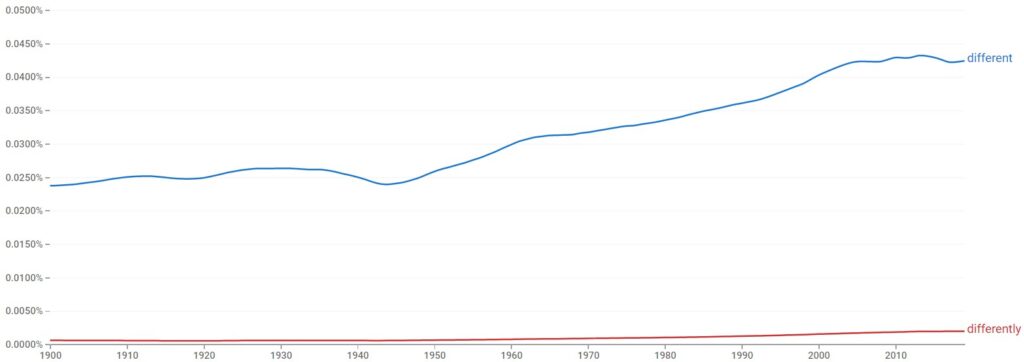The words “different” and “differently” may look the same, but the “-ly” ending is important. “Different” is an adjective used to describe a noun and it comes before that noun. However, “differently” is an adverb, used to describe a verb. An adverb usually follows the verb it describes.
Is It “Different” or “Differently”?
“Different” is an adjective, used to describe a thing or a person. However, “differently” is an adverb, which describes a verb. The adverb comes after the verb it describes. For instance, “The black dog is different” describes the dog, and “The black dog walks differently” describes how the dog walks.

We use “differently” when the verb implies movement, such as “walk”, “run” and “eat”. However, if the verb describes the state or condition of the thing or person, and there is no movement involved, we use “different”. Verbs that can describe a state or condition, include “be”, “appear”, “sound” and “taste”.
When To Use “Different”
We use “different” to contrast and compare things or people. We also use “different” to describe when the state or condition of a thing or person has changed. In other words, “different” describes change; “what” has changed but not “how” it happened. For instance, “the car engine sounds different”.
Here are a few examples of how to use “different” in a sentence:
- When he returned home after three months in the army, he looked different and he sounded different.
- When the violin is played with the fingers it sounds different to when it is played with a bow.
- They visited the estate agent because they wanted to look for a different house in the same city.
- Every day on the cruise ship there are always lots of different activities to choose from.
- In the middle of the night, the activity in the forest sounds different from every angle.
- The chocolate tastes different to how I remember it as a child.
- It is difficult to trust him for he has a different opinion on the subject every time I talk to him.
When To Use “Differently”
“Differently” is used to describe how an action is performed. Therefore, it is applied to verbs that imply movement or change. For instance, “She has a different walk.” describes the “walk”, a noun. However, “She walks differently.” describes “how” – the way she walks.
Here are a few examples of how to use “differently” in a sentence:
- Although they were brought up in the same family, she thinks and acts differently from her brother.
- They can always recognize their dog because he walks differently from other dogs.
- The two teams reached the same conclusion even though they approached the task differently.
- He spends more time at the gym and eats differently now that he has started looking after his health.
- The teachers noticed that the pupils perform differently when they are offered an incentive or some motivation to complete the task.
- In the months of July and August, the day is structured differently and there are fewer scheduled lessons.
- The process to hire new workers is implemented differently to how it used to be done in the past.
Which Is Used The Most?
It is common to use “different” to comment on how something looks and to compare it with another thing. However, the need to use “differently” to comment on how something is done is not required so often. This is reflected in the Google Ngram Viewer data which demonstrates that “different” is used around twenty times more often than “differently”.

Is It “Look Different” or “Look Differently”?
If a person or a thing appears to “look different”, we are referring to their state or condition, and so the adjective “different” is used. However, when “to look” is a verb of motion, as in “to look at”, we use the adverb “differently” to describe “how” the action was performed.
When we use “look” to describe appearance, the verb does not imply movement, and so we use the adjective, “different”. However, when the verb “to look” is an action verb, we can use “differently” to describe how the action was performed.
For example:
- Correct: When she puts on her make-up, she will look different.
- Incorrect: If she wears a long dress, she will look differently.
Is It “Act Different” or “Act Differently”?
Since the verb “to act” involves movement, it will be described by the adverb “differently”, so the phrase “act differently” is correct. The phrase “act different” can sometimes be heard, but it is incorrect, as “different” is an adjective, and so it describes a noun, not a verb.
“Differently” is an adverb and usually appears after the verb, However, “different” is an adjective which describes a noun, and it usually comes before the word it describes. Therefore, the phrase “act different” is never correct, although it will sometimes be found in speech.
For example:
- Correct: If you want to be recognized as a serious student, you will have to act differently.
- Incorrect: She doesn’t like the way we behave in the classroom, and she says we must act different if we want to succeed.
Is It “Hits Different” or “Hits Differently”?
When the words “hits different” is used, “different” will refer to the objects that follow, for example, “The arrow hits different targets.” However, when “hits differently” is used, “differently” refers back to “how” the action is performed, for instance, “The arrow hits differently each time it is fired.”
Therefore, “different” will refer to the objects that follow, and “hits differently” will refer back to the action performed by the subject of the sentence. This can be seen in the sentence: “The batsman hits differently when the sun is low in the sky.”
For example:
- Correct: The ball hits the ground differently when the spinner bowls too quickly.
- Incorrect: The ball hits the ground different when it is spinning.

Martin holds a Master’s degree in Finance and International Business. He has six years of experience in professional communication with clients, executives, and colleagues. Furthermore, he has teaching experience from Aarhus University. Martin has been featured as an expert in communication and teaching on Forbes and Shopify. Read more about Martin here.

